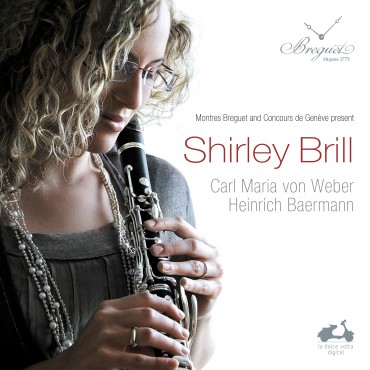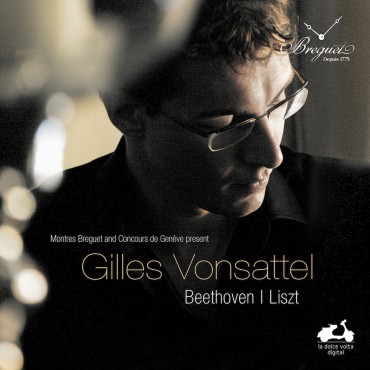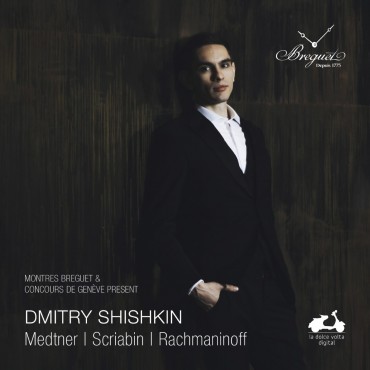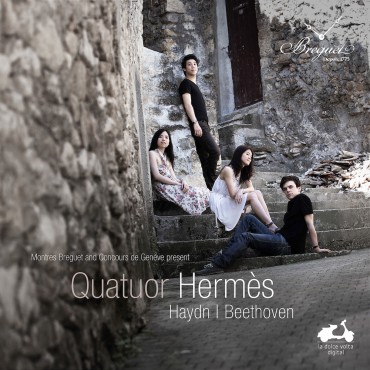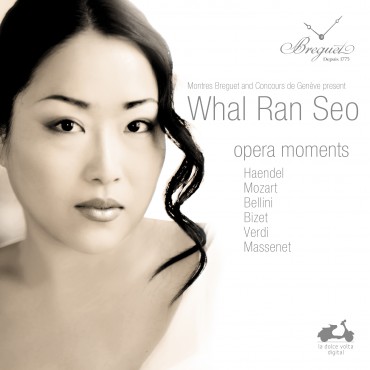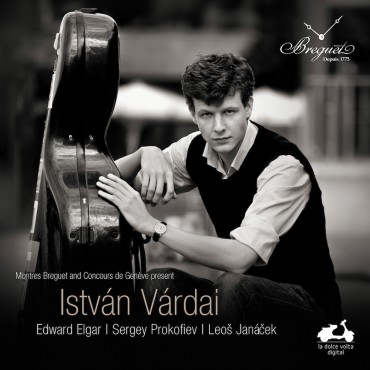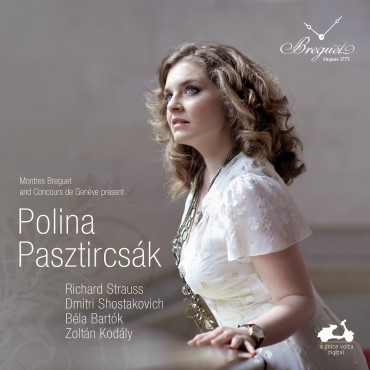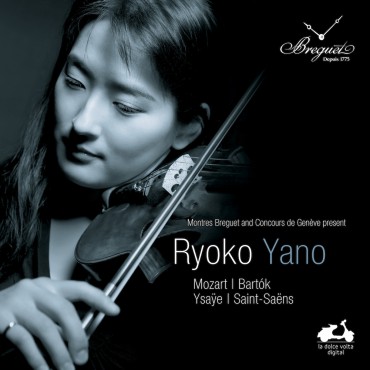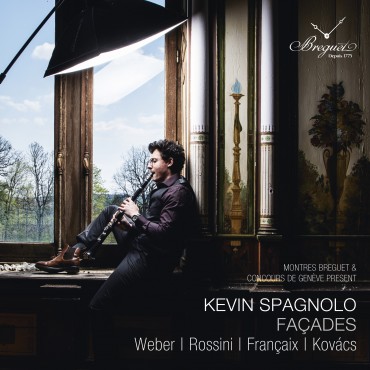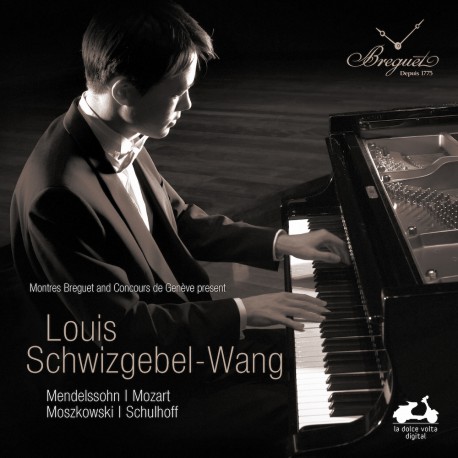 View larger
View larger Louis Schwizgebel (Piano)
Mendelssohn / Piano Concerto n°2
LDV213
New
Louis Schwizgebel chose for his first recording a programme ideally suited to his temperament and his strengths.
More info
A Mendelssohn concerto, virtuoso pieces by Moszkowski, the Jazz Études of Schulhoff, all works that get a hearing from time to time but are rarely played in concert, agile and hair-raisingly difficult for the performer yet containing great riches.
Their common feature is that they call for refined, delicate virtuosity that nevertheless does not preclude expressivity: qualities that are exactly those of this astonishing young pianist, a child prodigy, a master of origami, yet disarmingly straightforward. He dominates his programme from beginning to end, delighting his listeners with the elegance and precision of his playing.
A total success, auguring well for a formidable career.
+ Playlist
+ CD content
Felix Mendelssohn Bartholdy
Piano Concerto No. 2 in D Minor, Op.40
Moritz Moszkowski
Melodie op.18
Etude in A-Flat, Op. 72 No. 11
Charasteristic Pieces Op. 36 No. 6 - "Sparks"
In Autumn, Op. 36 No. 4
Caprice Espagnol, Op. 37
Wolfgang Amadeus Mozart
Piano Sonata KV 311
Erwin Schulhoff
5 Jazz Studies
TOTAL TIMING: 65'08
+ Louis Schwizgebel
Born in 1987 to a Chinese mother and a Swiss father working in the field of visual arts, and the grandson of a famous Chinese painter, Louis Schwizgebel-Wang began studying piano with Franz Josefovski at the age of six. Three years later, he reached the superior level of the Lausanne Conservatory in Brigitte Meyer’s class. At fifteen years’ old, he graduated with honors as a soloist. He is currently pursuing his studies at the Geneva Conservatory in the advanced class given by Pascal Devoyon and also takes classes with Jean Jacques Balet. The number of hours devoted to the study of his instrument does not prevent him from pursuing his education as a student at the “Gymnase Auguste Piccard” where he is preparing his baccalaureate with a major in science. Louis Schwizgebel-Wang gave his first concerts at the age of nine. He performed in Europe, in Kirghizstan, in Canada and Poland, also playing for radio and television broadcasts. In 1999, he became a Laureate of the “Leenards” Foundation. He represented Switzerland at the 9th Steinway Festival in Hamburg in 2000 and played at the Gianadda Foundation in Martigny. In 2003, he won the 1st Prize with honors and the Prize for the Best Performance of a Swiss work in the final of the Swiss Youth Music Competition, as well as the Paderewski Prize.
In 2004, he performed with the Basle Philharmonic Orchestra during a concert tour in China, and more recently with the Orchestre Suisse Romande for a prelude-concert at the Victoria Hall and with the Sine Nomine Quartet in Lausanne at the festival carrying the same name. In 2005, he won 2nd Prize of the Geneva International Music Competition (1st Prize not awarded), as well as the “Coup de Cœur Breguet” Prize (which consists of a making this first record) and the Public Prize.
+ The Geneva chamber Orchestra
Its rise to fame is dazzling: in less than fifteen years, the Geneva chamber Orchestra (OCG) has grown from a semi- professional ensemble to a fully-fledged, first-rate orchestra, the only one of its type on the Geneva music scene.
Spurred on by German conductor Michael Hofstetter, who took over the ensemble in 2001, the OCG has developed its own very personal sound, while aiming for authenticity in its approach to historic interpretation. Favouring a repertoire stretching from late Baroque to the Romantic period, Michael Hofstetter seeks to bring out the original colouring of the works approached by presenting them on period instruments. Gut strings, classical bows, wooden flutes and natural brass have thus found their way into the orchestra, alongside modern instruments.
But the OCG does not perform only works from the past: contemporary composers are not neglected and their works are set in perspective by performance alongside earlier compositions. The OCG also makes a point of honour of reviving or bringing greater prestige little-known or forgotten composers. Joseph Martin Kraus, Joseph Leopold Eybler and Jean-Ferry Rebel are among those who have been spotlighted in recent concerts.
Based in Geneva, the OCG presents six or seven subscription concerts in the Bâtiment des Forces Motrices each season. Its other activities, totalling about fifty performances a year, include work in collaboration with the City of Geneva (Sunday concerts, Summer serenades) and with various choirs in Geneva and French-speaking Switzerland, co-productions with other ensembles (notably the Orchestre des Pays de Savoie), an annual production with Freiburg Opera, a partnership with the Geneva International Competition, concerts for young people, radio broadcasts and CD recordings, tours in Switzerland and abroad, and also private concerts. Succeeding Thierry Fischer and Lev Markiz, Michael Hofstetter has strengthened the orchestra’s approach and raised its quality still higher, so that it now works with the finest conductors and soloists, including Armin Jordan, Paul Goodwin, Arnold Östman, Alessandro de Marchi, Nathalie Stutzmann, Aldo Ciccolini and Matthias Goerne.
The orchestra’s success, which has already been recognised in artistic milieus, was recently acclaimed by the world of business: in May 2005 the OCG was awarded the Michel Baettig Prize in recognition of its exceptional achievement and the accomplishment and dynamism of its team.
+ Paul Goodwin
An eclectic conductor, Paul Goodwin directs operas and concerts spanning a repertoire ranging from Monteverdi to Maxwell Davies and played on ancient or modern instruments. He is Associate Conductor of the Academy of Ancient Music (AAM) in London.
He has conducted many operas by Mozart, Händel, Haydn, Gluck or Monteverdi in venues all over Europe (Opera North, Opéra Comique, Halle, Mannheim or at the Liceu) and this season will include Indomeneo in Graz and Orfeo in Madrid.
Since being appointed to the AAM in 1996 by its founder Christopher Hogwood, he has reoriented the policy of the orchestra which now regularly commissions works by contemporary composers. He thus conducted the first productions of two pieces by Sir John Tavener, Eternity’s Sunrise (1998) and Total Eclipse (2000).
As principal guest conductor of the English Chamber Orchestra, Paul Goodwin has accompanied many famous soloists such as Kiri Te Kamawa, Joshua Bell and Mstislav Rostropovitch.
In response to regular invitations from around the world, Paul Goodwin has conducted such famous formations as the Camerata Academica Salzburg, the City of Birmingham Symphony Orchestra, l’Orchestra National de Lille, the Seoul Philharmonic, the Washington Orchestra, the SWR Symphony Orchestra, as well as many chamber orchestras including those of Zurich, Geneva, Prague and Scotland. These collaborations have given rise to many recordings, including a disc dedicated to Strauss and another to Stravinsky to be released this year.
Extremely committed to the field of education, Paul Goodwin takes an active part in classes at the Dartington summer school and works with many young European orchestras in the baroque and classic repertoires. He is regularly invited to conduct at the finals of prestigious international competitions such as the Queen Elisabeth International Music Competition of Belgium and the Geneva International Music Competition.
Long considered one of the foremost oboists in the baroque register before deciding to devote himself entirely to his conducting work, he has recorded over twenty CDs as a soloist in the baroque and classic fields.



